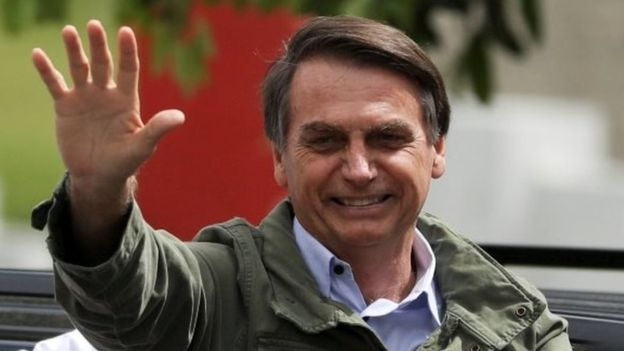Far-right politician Jair Bolsonaro has won a sweeping victory in Brazil’s presidential election.
The former army captain won 55.2% of the vote against 44.8% for Fernando Haddad of the left-wing Workers’ Party.
Mr Bolsonaro’s pledge to fight crime and corruption following a string of scandals have won him mass support.
However critics are worried by his praise of Brazil’s former dictatorship, and by his comments on race, women and homosexuality made during the campaign.
In one infamous incident in 2015 he told a fellow lawmaker she was too ugly to rape.
For supporters, he is a politician who they say will bring much needed change to the country – a swing to the right after four elections won by the left.
What does it mean?
Mr Bolsonaro’s victory constitutes a markedly rightward swing in the largest democracy in Latin America, which was governed by the Workers’ Party (PT) between 2003 and 2016.
For the past two years, the country has been led by a conservative, Michel Temer, following the impeachment of President Dilma Rousseff. But Mr Temer has proven deeply unpopular with Brazilians.
With the outgoing president’s approval rating at a record low of 2%, voters clamoured for change but they were deeply divided on which way that change should go.
Mr Bolsonaro’s 10-percentage-point victory means the vision he laid out to voters of a Brazil where law and order and family values would be made the priority won out.
Who is Bolsonaro and what is he likely to do once in office?
The 63-year-old leads the Social Liberal Party (PSL), an anti-establishment group that combines social conservatism and pro-market policies.
Mr Bolsonaro is a deeply polarising figure whose controversial remarks earned him the nickname of “Trump of the Tropics”.
He has the past defended the killing of opponents to the country’s former military regime and said he is “in favour of dictatorship”.
But after the results came in, he told supporters he would be a “defender of democracy” and uphold the constitution.
One of his flagship policies is to restore security by relax gun laws and suggested that “every honest citizens” should be able to own a gun.
He has promised to reduce state intervention in the economy and indicated that Brazil could pull out of the 2015 Paris Agreement on climate change.
Mr Bolsonaro’s promise to “cleanse” Brazil of corruption has proved particularly popular in a country that has seen dozens of politicians from the mainstream parties jailed.
How did the vote break down?
Mr Haddad won in the north-east of Brazil, the heartland of the Workers’ Party and the stronghold of former President Luiz Inácio Lula da Silva, whom Mr Haddad replaced on the Workers’ Party ticket after Lula was barred from running.












